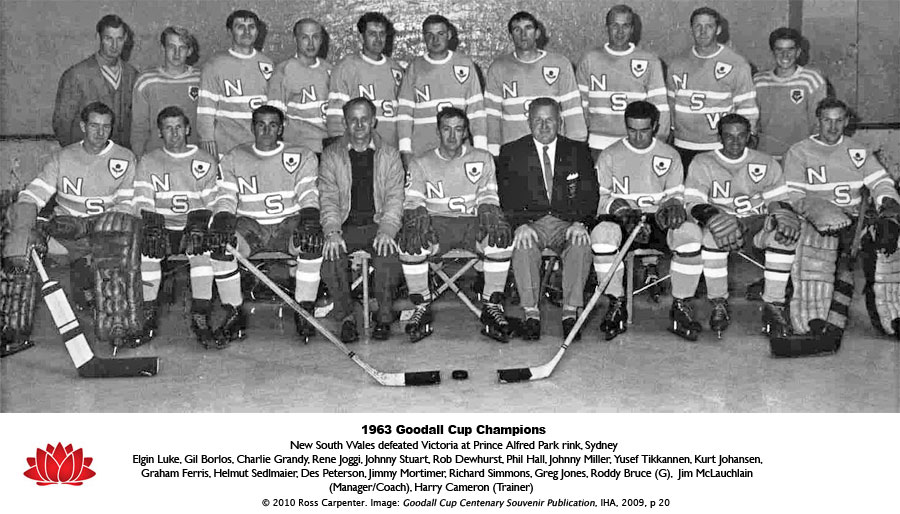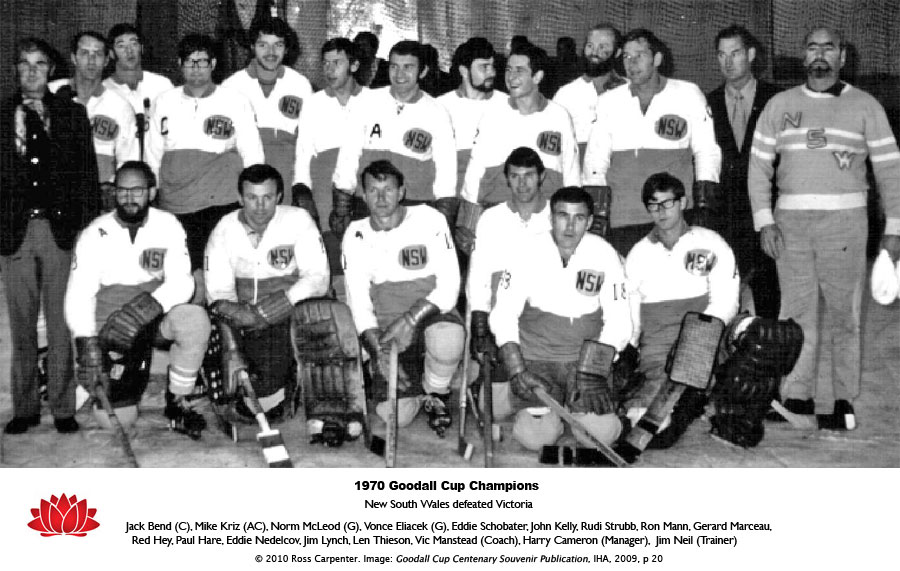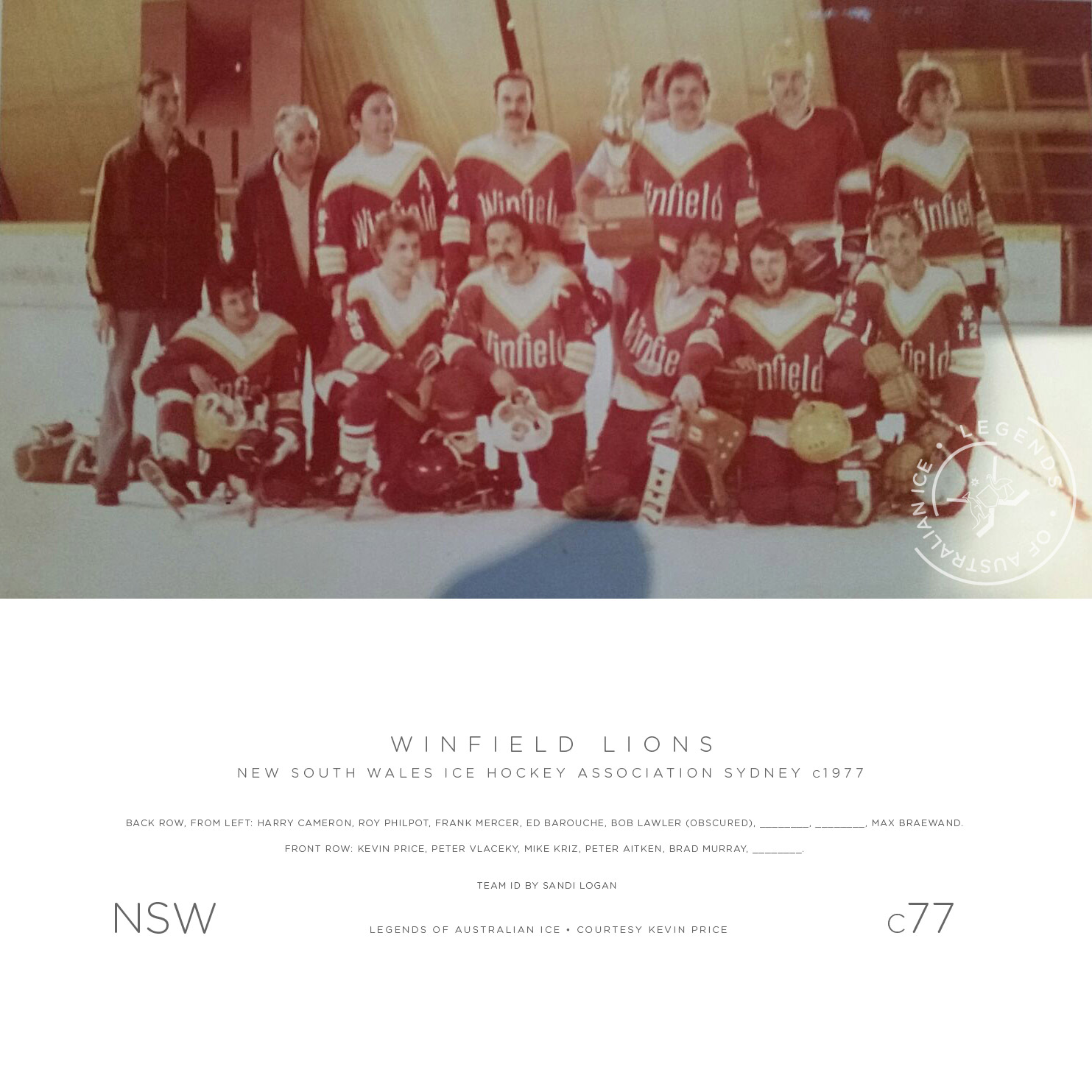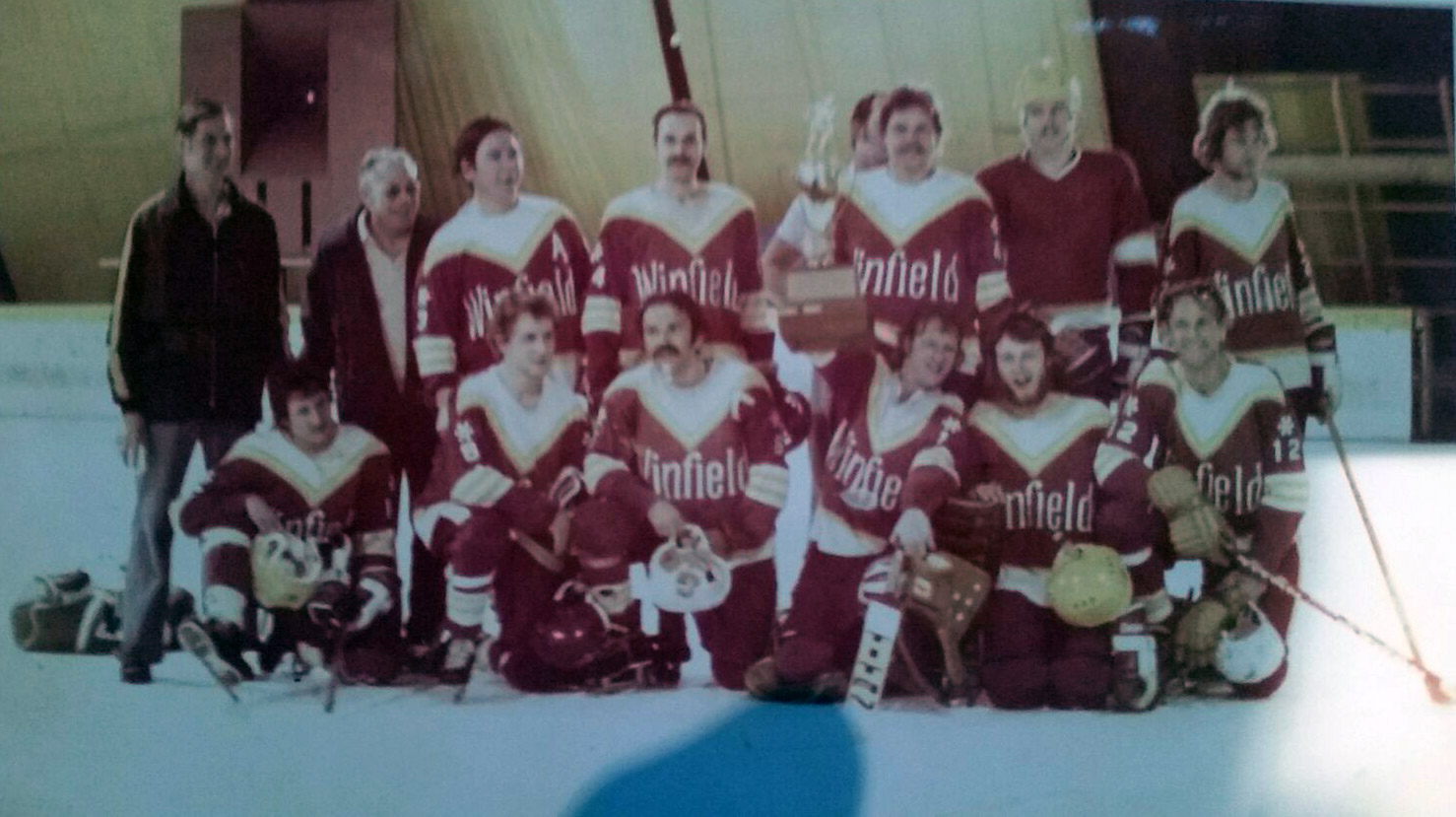

[Top] Captain of Glebe Lions defeating West Tigers in the first grade final, Prince Alfred Park ice rink, Sydney, 1962. Courtesy Des Peterson. [Beneath] Manager of the Winfield Lions, Barclay Theatre, Sydney, May 1977. Full image— back row, from left: Kevin Price, Noel Taylor; Middle: Dave Emblem, Cory ____, Harry Cameron; Front: Terry Bush, Peter Aitken, Andy Wright. Courtesy Kevin Price.
CAREER SUMMARY
Birth
January 5th 1922
Botany Sydney Australia
Death
1983
Darlinghurst Sydney Australia
Clubs
NSWIHA Glebe, Winfield Lions, Canterbury Ice Hawks
Goodall Cups
1946 (tie), 1963 (Tnr), 1970 (Mgr), 1980 (Mgr)
World Championships
1974 (Mgr)
Life Memberships
State Association 1969
Game official
State secretary and president
Hudson Trophy 1969
Australian Club Championship [2]
BORN HARRY ALPHONSUS CAMERON on January 5th 1922 at Botany in Sydney's south-east, [4] he learned to skate at the old Glaciarium, and joined the Glebe ice hockey club where he earned his nickname "Elbows". During the world war in 1943, he married Patricia Joan Meadham, [6] and enlisted in the RAAF as a Leading Aircraftman with the 5th Airfield Construction Squadron. [4] He was 23 when his discharge came through in November 1945.
On June 6th 1946, he played for the Services team in the Victory Celebration Match!, Services versus the Rest, captained by Jim Brown with Percy Wendt, Ken Kennedy, Victorian Ellis Kelly, and Bob Hayes from the Streatham club in London.The press reported the game was thrilling and attended by a full house. The young Geoff Thorne for "The Rest" had a busy night, twice sent off for fighting, and once carried off unconscious. The Services team won 2-0 [3] and, according to Syd Tange, the match lived on in the memories of all the players and officials of the era.
Cameron represented New South Wales in the tied series for the 1946 Goodall Cup, the first interstate series after the war interruption. New South Wales retained custody of the trophy. He played in the unsuccessful state squad that lost to Victoria in Sydney in 1949. The victors had the Hungarians, Tommy Endrei and Sandor Miklos, who was reputedly one of the best stick-handlers of the time. Their passing prowess helped decide the result. Cameron was still scoring goals for the Glebe Lions in 1951 when former Czech representative Emil Buchatsky joined the club for his first matches in Australia, before transferring to Dick Groenteman's Bombers. [7] Buchatsky made the state team in his first season.
As a state referee, Cameron sometimes officiated difficult incidents, including a reported brawl that broke out at the end of Bombers versus Wests match-up in mid June, 1953. An argument between the rival captains, Dick Groenteman and Reg Andrews, triggered fighting with sticks, skates and fists. Two women spectators suffering head injuries received ambulance attention, and state president Ken Kennedy "stopped two heavy punches in the face in trying to pacify brawling players". The association held an inquiry.
Cameron led the Lions in the defeat of West Tigers to win the state premiership in 1962, then defeated the St Kilda Blackhawks 5-2 in Melbourne in the Australian Club Championship. It was the first year the series became a permanent fixture. Much of the credit went to Cameron's nephew Wayne Brown, a 1.9m (6'3") defenseman, who Harry had introduced to the sport in 1952, before the old Glaciarium closed. [1] Brown, a fitter, might have made the cut for the 1962 Worlds Team, but he could not afford the cost of the trip. The Lions trained by Cameron also won the 1963 state premiership (Chalwin Trophy), and he trained the successful 1963 Goodall Cup Champions.
In 1968, when cooperation between clubs was at a low-point, Cameron held responsibility for controlling hockey in the state with Dick Mann, J Mortimer, J Neil, and Vic Mansted. Their 5-man committee replaced the state executive. [8] In 1969, Cameron became state secretary, serving three years under presidents Mortimer and Mansted. That same year, the state association awarded him Life Membership, and the national association honoured him with the HC and SM Hudson Trophy for ten years unbroken service to the sport. Cameron was the state's third recipient of the Hudson after Ken Kennedy and Syd Tange.
In 1970, he managed the state's successful Goodall Cup championship team, and in 1973 he became president and secretary of the state association. His club made Australian Club Champions in 1975 for the second time, and he was still a trainer-manager of the Lions in 1977 when Kevin Price and Noel Taylor played. He managed the successful 1980 Goodall Cup team in Brisbane coached by Dan Pederson, with such notable players as Logan, Kenning, Terry George, the Lindsay brothers, Phil Ginsberg Jnr and Chris Spike. It was the first Cup victory for the state in nine years.
"Without Harry a lot of things would not have happened," according to Jim Lynch in 2019. "Putting out the nets around the rink and taking them off. He was one of the nicest people in the world". [9] "Harry was an intricate part of the management team at the 1974 IIHF World Championships in Grenoble," said Allan Harvey "and was a calming voice for any issue we encountered". [9] A player, team manager, referee and administrator, Harry Cameron's hockey career was approaching a fourth decade when he died at 61 in Darlinghurst, Sydney, in 1983.
Ross Carpenter, 'Cameron, Harry (1922-1983)', Legends of Australian Ice, Melbourne, Australia, http://icelegendsaustralia.com/legends_2/bio_cameron.html, accessed online .
[2] Brawl at ice hockey, The Daily Telegraph, 26 June 1953, p 3.
[3] Victory Celebration Match! Services versus the Rest, Syd Tange, The NSW Ice Hockey Association, 1999, p 49
[4] World War 2 Nominal Roll, RAAF service record of Harry Cameron of Botany. At Citation 1, Cameron was from Botany. At citation 1, his Next of Kin was Pat and at Citation 6 he married Patricia Joan.
[5] New South Wales Births Deaths and Marriages Registry, Reg No 9858/1983. Harry Cameron died in Darlinghurst, Sydney in 1983.
[6] New South Wales Births Deaths and Marriages Registry, Marriage Reg No 13532/1943
[7] Czech star in ice hockey, The Sydney Morning Herald, 8 June 1951, p 10.
[8] The NSW Ice Hockey Association, Syd Tange, 1999, p 103.
[9] Legends Facebook, 25 June 2019. Comments on biography by former ice hockey players, Jim Lynch and Allan Harvey.
Citations | 1 - 280 | 281-on |





